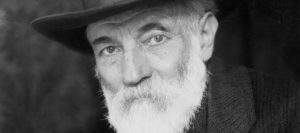Fintan O’Toole in New Statesman:
 All women become like their mothers,” says Algernon in The Importance of Being Earnest. “That is their tragedy. No man does, and that is his.” Left hanging there, of course, is the implication that the son’s tragedy is that he becomes like his father instead. In Oscar Wilde’s own case, that might not have been such a terrible thing, at least for his creative productivity. Colm Tóibín’s sparkling little book on Sir William Wilde, WB Yeats’s father John and James Joyce’s father John Stanislaus, seems originally to have been called “Prodigal Fathers” – the phantom title appears on the inside flap of the cover. It may have been dropped because of Sir William, for whom the word – with its implications of wasted talent – is a poor fit. But it certainly works for John Butler Yeats and John Stanislaus Joyce. And yet the joy of Tóibín’s erudite, subtle, witty and often deeply moving biographical essays is that one generation’s paternal prodigality can become the next generation’s powerhouse of neurotic energy.
All women become like their mothers,” says Algernon in The Importance of Being Earnest. “That is their tragedy. No man does, and that is his.” Left hanging there, of course, is the implication that the son’s tragedy is that he becomes like his father instead. In Oscar Wilde’s own case, that might not have been such a terrible thing, at least for his creative productivity. Colm Tóibín’s sparkling little book on Sir William Wilde, WB Yeats’s father John and James Joyce’s father John Stanislaus, seems originally to have been called “Prodigal Fathers” – the phantom title appears on the inside flap of the cover. It may have been dropped because of Sir William, for whom the word – with its implications of wasted talent – is a poor fit. But it certainly works for John Butler Yeats and John Stanislaus Joyce. And yet the joy of Tóibín’s erudite, subtle, witty and often deeply moving biographical essays is that one generation’s paternal prodigality can become the next generation’s powerhouse of neurotic energy.
The Oedipal force is at least as strong in Irish male writing as it is in Star Wars. It is not, of course, uniquely so. Oedipus, so far as we know, did not come from Dublin and nor did Turgenev, Edmund Gosse or Edward St Aubyn. But if parricide is an imported taste, it is, like tea-drinking, one that appealed greatly to the native palate. In the quintessential Irish play, John Synge’s The Playboy of the Western World, Christy Mahon kills his father twice and, at least the first time, is idolised for his boldness. Bernard Shaw had such contempt for his father that he dropped his own given name George because it was a paternal inheritance. “I don’t want to be a father,” says the Dauphin in Saint Joan, “And I don’t want to be a son.” Shaw spent the insurance money from poor George Shaw’s death on a new Jaeger suit and a packet of condoms. George Moore, in Confessions of a Young Man, expresses a similar sense of liberation on his father’s death. Indeed, one of the many things that makes Samuel Beckett stand out from his peers among the Irish modernist immortals, is that he loved his father and might, at least at times and at least in his imagination, happily have killed his mother.
More here.
